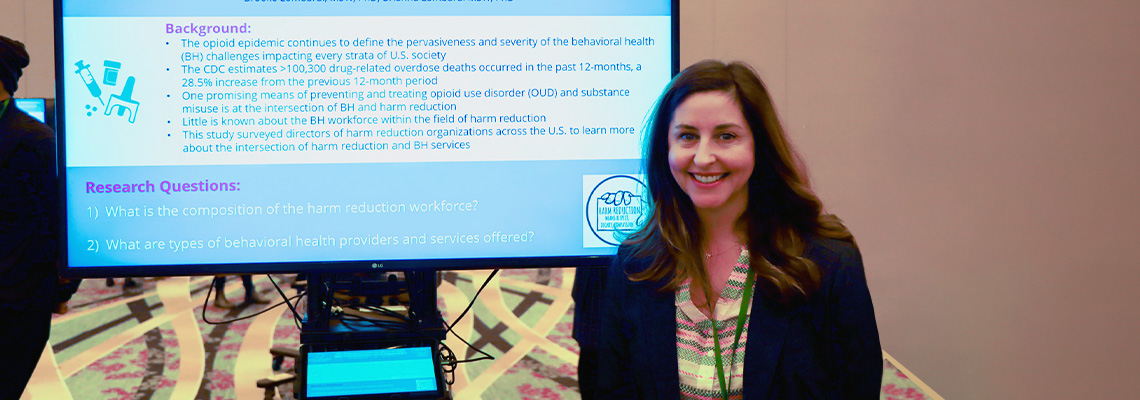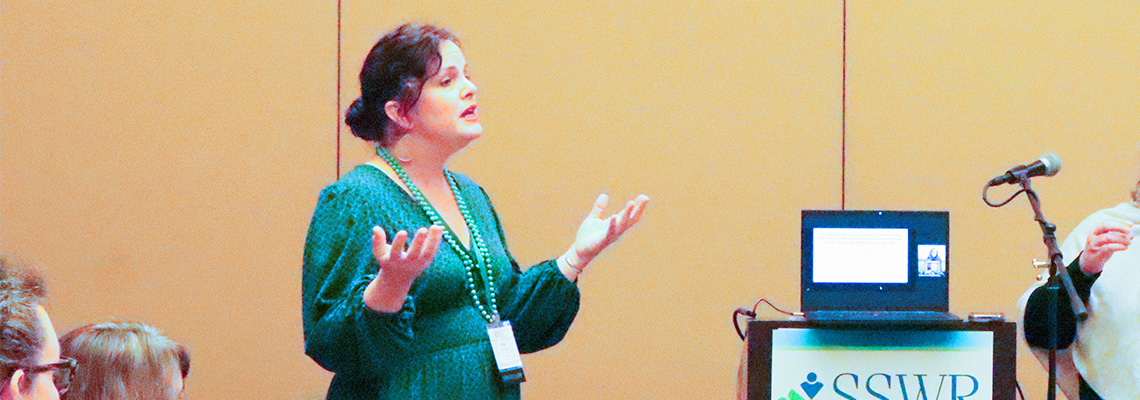by Chris Hilburn-Trenkle
Pictured: Associate Professor Sarah E. “Betsy” Bledsoe
A group of four researchers at the University of North Carolina at Chapel Hill School of Social Work shared a presentation and led a roundtable discussion regarding how health research supported by the National Institutes of Health is influenced by who reviews proposals and ways to diversify the funding processes and efforts to involve social workers and community members with lived experiences in NIH study sections and panels on Friday, Jan. 12, at the 2024 Society for Social Work and Research.
The presentation, “Social Work and National Institutes of Health Funding Decisions: Can We Democratize and Decolonize Health Science Knowledge without a Seat at the Table?” was led by Sandra Reeves Spears and John B. Turner Distinguished Professor of Social Work Trenette Clark Goings, Associate Professor Sarah E. “Betsy” Bledsoe, Associate Professor Joy Noel Baumgartner and Associate Professor and Prudence F. and Peter J. Meehan Early Career Distinguished Scholar Amy Blank Wilson. David Pollio of the NIH’s Center for Scientific Review was involved in the presentation but was unable to attend the annual conference, held at the Marriott Marquis in Washington, D.C.
Bledsoe began the presentation by sharing a study she conducted in April 2023 on NIH standing study sections and specialist interest panels. Of the 138 panels, she reviewed 33 that were the most relevant to social work research and found that there was a clear lack of representation among social workers within these panels, which were dominated by psychiatry and psychology.
Not only was there a lack of social workers involved in the panels, but there was a lack of diversity, with 70.3% of reviewers identifying as white and 55.6% of principal investigators identifying as white, according to data from 2021.
Despite the data, there were promising signs of improvement within the system. Blank Wilson shared that the NIH is adapting its practices to attempt to diversify the funding processes for selecting grant recipients to allow more room for a larger group of principal investigators. In addition, the NIH is creating training for study section members.
Blank Wilson and Baumgartner noted the importance of recognizing the absence of social workers within these studies and panels and enlisting the help of individuals with lived experiences to raise awareness and show why their presence at the table was needed.
“Social workers are critical providers of mental health care globally, and we work to ensure the social determinants of health are addressed in clinical and community-based settings,” Baumgartner said. “Social work faculty have expertise in clinical practice, community-engaged research, and leading clinical trials to test innovative interventions, all with a healthy equity lens—our participation in NIH reviews and panels only strengthens NIH’s ability to review and fund impactful research to improve mental health and behavioral health services.”
Following the slideshow presentation, members of the audience, which included social work students and researchers, engaged in a spirited discussion with the presenters, sharing their own experiences with NIH panels and study sections, asking questions related to the presentation and sharing ways that both social workers and community members with lived experiences could see their involvement grow in review sections.
Blank Wilson was inspired by the interest generated for the presentation and the lively discussion and experiences shared by audience members.
“It is hard sometimes to share that stuff,” Blank Wilson said. “Sometimes it feels like a zero-sum game. So having a lot of people come with interest, sharing their experiences, people offering strategies and their findings that was useful. I was incredibly thankful to be a part of it.”







